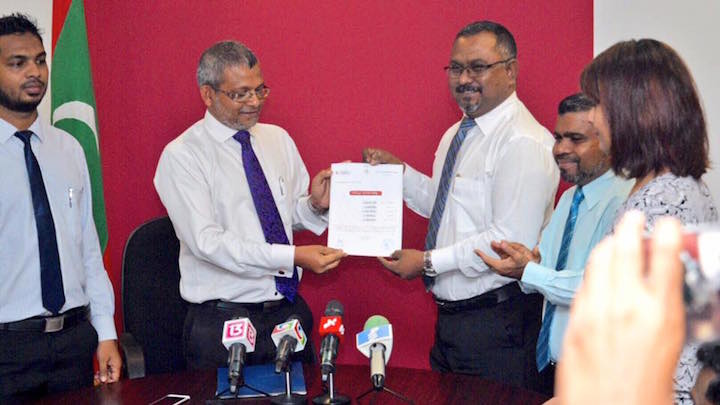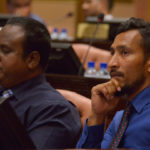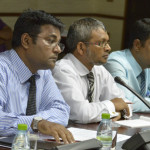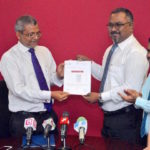The broadcasting regulator has slapped a fine of MVR200,000 (US$12,970) on the state-owned Public Service Media over defamatory remarks made by a ruling party lawmaker at a televised press conference in April.
Former Home Minister Umar Naseer filed the defamation complaint against MP Ibrahim Falah after the deputy leader of the ruling Progressive Party of Maldives accused him of awarding projects to paper companies for the July 2015 Independence Day celebrations.
Naseer filed complaints with both the police and the Maldives Broadcasting Commission shortly after Falah’s speech was televised live by the Television Maldives channel operated by PSM as well as the pro-government Channel 13.
In a statement issued Tuesday after concluding an inquiry into the complaint, the commission said the PSM was unable to provide a legal defence for broadcasting Falah’s remarks.
It is unclear if Channel 13 is also under investigation.
The controversial anti-defamation law passed in August 2016 holds broadcasters responsible for slanderous content aired during live events. The regulator was also authorised to suspend or cancel broadcasting licences if fines are not paid within 30 days.
The fine must be paid in full before the regulator’s decision could be appealed to a court.
The seven-member commission has previously imposed hefty fines on the opposition-aligned Raajje TV, including a fine of MVR1 million (US$64,850) for airing a speech that was deemed defamatory towards President Abdulla Yameen.
In mid-June, the MBC also imposed an MVR500,000 (US$32,425) fine on the main cable television provider for rebroadcasting an Al Jazeera corruption exposé.
The re-criminalisation of defamation in August last year was widely condemned as an attack on free speech. A consensus emerged among the Maldivian media that the law would be the death knell of press freedom in the country.
But a senior editor at TVM told the Maldives Independent after the defamation law came into force that it would not deter state media.
“We are funded by the taxpayer. Even if penalised, the money will go straight to the government. It will be business as usual,” the editor said.
“TVM is a government mouthpiece. Even if we might not think like them, we can’t speak out openly against it or there will be disciplinary measures.”
In the days leading up to the vote on the defamation bill, the state broadcaster was told to defend the draconian law on religious grounds.
“We had several panel discussions and featured pro-government lawyers and MPs. The brief was that there needs to be some restraint on these fundamental freedoms,” he said.
“When you use religion to promote something, people will easily believe you.”
Hours after the law was ratified, the channel showed a two-minute news package criticising a tweet by former President Maumoon Abdul Gayoom, who had previously urged ruling-party lawmakers to vote against the bill.
The report raised questions about the sanity of the 78-year-old former president and accused him of working with the exiled opposition leader, former President Mohamed Nasheed.
“This might have been a bait for the opposition to use the law to its advantage,” said the TVM editor. “This might give them room to accuse the opposition of double standards.”
The broadcasting commission dismissed a complaint alleging defamation of the former presidents in December.
The seven-member MBC has previously been accused of double standards after the appointment of Fathmath Zaina and Zeena Zahir in April 2016 by the ruling party-dominated parliament.
Both former journalists were working under First Lady Fathmath Ibrahim at the president’s re-election campaign office.
The Maldives is now ranked 117 out of 180 countries in the Reporters Without Borders annual press freedom index, down from 112 the previous year.




















